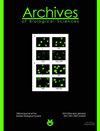Elevated barometric pressure suppresses cell proliferation by delaying the G2/M phase and weakening integrin-mediated cell adhesion and actin assembly
IF 0.8
4区 生物学
Q4 BIOLOGY
引用次数: 0
Abstract
Human cells are continuously exposed to various stress factors in their physiological environment. Evidence suggests that certain mechanical stress can affect cell cycle progression and cell proliferation. However, the signaling pathways involved in this process are not well understood. To investigate this, we developed a pressure chamber capable of producing an elevated barometric pressure (EBP) environment of 2?atmospheric absolute pressure (ATA). We then studied the effect of EBP on cell proliferation and its underlying mechanism. Our results show that EBP inhibited cell proliferation by delaying the G2/M phase. Specifically, EBP reduced the expression levels of cell adhesion-related genes and downregulated integrin subunit genes, resulting in weaker interaction between cells and extracellular matrix proteins. In addition, Ras-related C3 botulinum toxin substrate 1 (Rac1) and cell division control protein 42 homolog (Cdc42) activity was suppressed, and actin assembly was decreased. These findings suggest that the EBP-mediated G2/M phase delay is due to attenuated cell adhesion and actin cytoskeleton assembly, leading to the inhibition of cell proliferation. Our results provide a crucial molecular mechanism for how certain pressure (changes) can negatively regulate cell proliferation. These findings could potentially be used in the future to develop a pressure therapy to inhibit cell proliferation in cancer patients.升高的气压通过延迟G2/M期和削弱整合素介导的细胞粘附和肌动蛋白组装来抑制细胞增殖
人体细胞在生理环境中不断受到各种应激因素的影响。有证据表明,一定的机械应力可以影响细胞周期进程和细胞增殖。然而,参与这一过程的信号通路尚不清楚。为了研究这一点,我们开发了一种压力室,能够产生2?大气绝对压力。研究了EBP对细胞增殖的影响及其机制。结果表明,EBP通过延缓G2/M期来抑制细胞增殖。具体而言,EBP降低了细胞粘附相关基因的表达水平,下调了整合素亚基基因的表达水平,导致细胞与细胞外基质蛋白的相互作用减弱。此外,ras相关C3肉毒毒素底物1 (Rac1)和细胞分裂控制蛋白42同源物(Cdc42)活性被抑制,肌动蛋白组装减少。这些发现表明,ebp介导的G2/M期延迟是由于细胞粘附和肌动蛋白细胞骨架组装减弱,导致细胞增殖受到抑制。我们的结果为某些压力(变化)如何负调控细胞增殖提供了一个关键的分子机制。这些发现可能在未来用于开发一种抑制癌症患者细胞增殖的压力疗法。
本文章由计算机程序翻译,如有差异,请以英文原文为准。
求助全文
约1分钟内获得全文
求助全文
来源期刊
CiteScore
1.40
自引率
0.00%
发文量
25
审稿时长
3-8 weeks
期刊介绍:
The Archives of Biological Sciences is a multidisciplinary journal that covers original research in a wide range of subjects in life science, including biology, ecology, human biology and biomedical research.
The Archives of Biological Sciences features articles in genetics, botany and zoology (including higher and lower terrestrial and aquatic plants and animals, prokaryote biology, algology, mycology, entomology, etc.); biological systematics; evolution; biochemistry, molecular and cell biology, including all aspects of normal cell functioning, from embryonic to differentiated tissues and in different pathological states; physiology, including chronobiology, thermal biology, cryobiology; radiobiology; neurobiology; immunology, including human immunology; human biology, including the biological basis of specific human pathologies and disease management.

 求助内容:
求助内容: 应助结果提醒方式:
应助结果提醒方式:


